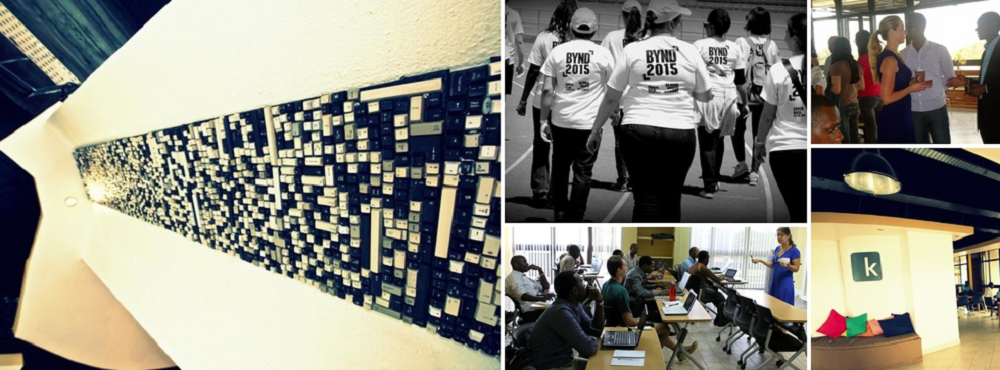The Rwandan government has played a crucial role in boosting tech innovation and allowing the country to become one of the fastest growing economies in the world, according to kLab general manager Claudette Irere.
Twenty-one years ago this week, the Rwandan genocide got underway, beginning a series of massacres that would ultimately claim the lives of up to one million people in just 100 days. Now, however, the country is held up as a beacon of hope, economically at least, with technological progress at the heart of this rejuvenation.
On a macro level, Rwanda is making progress, with the country launching its first high-speed 4G/LTE network late last year. In terms of the country’s startup and entrepreneurial ecosystem, the kLab incubator in the capital KIgali is the symbol of the country’s development.
A joint initiative between the ICT Chamber of the Rwanda Private Sector Federation (PSF), the Rwanda Development Board (RDB) and the Japanese International Cooperation Agency (JICA), kLab is crucial to Rwanda’s vision of becoming a middle income and knowledge based economy by 2020. Launched in May 2012 with 20 members, it now has over 400 registered members and 30 startups using the space every day.
Irere told Disrupt Africa the government of Paul Kagame was absolutely pivotal in its beginnings and remained vital to its ongoing success.
“Without the support of the government, places like kLab would have never seen the light of day. The government support is felt in the whole value chain of innovation,” she said.
“Rwanda’s tech scene is on the rise now more than ever. In a country that is still on the journey of rebuilding itself and embracing the use of technology, there are one and a million opportunities for everyone. The government and the private sector are great supporters.”
For all the progress, however, Irere said investors are still reluctant to invest in Rwanda, a situation it is part of kLab’s remit to address.
“The fact that Rwanda is landlocked and small is a setback to many investors. However, through the East African integration, Rwanda is well positioned to attract more investors as it offers a stable and strategic gate to the whole of East Africa,” she said.
kLab’s programmes are designed to make sure there are innovative companies with solid business nouse available for funding as investor interest increases.
“Our main programme is mentorship. Mentorship that comes in different folds – we run trainings both technical and business related, we partner with different organisations that offer mentoring, such as the Cherie Blair mentorship programme for business women, Grow Movement, the Rwanda Business Development Centre, but we also have individual mentors who sit at kLab a few times a week to offer their help to the tenants,” Irere said.
The hub’s latest programme is StartupWave, a virtual incubation programme it is currently piloting in advance of a possible rollout on a larger scale in the country.
The online educational platform links startups to mentors and prepares them to meet investors, helping entrepreneurs validate their ideas, learn business modeling, and develop their business plan.
“StartupWave provides both pre-incubation and incubation services with online and offline support, and there is no need to travel, relocate, or follow a fixed schedule,” Irere said.
“The pre-incubation services are designed for idea to pilot stage startups – anyone with a business idea can access these services for free. The incubation services however are designed to help startups raise investment.”
kLab itself does not fund startups, though Irere said it performs a valuable role in providing indirect funding.
“Through providing the space, electricity and fast Internet for free, kLab considers itself as a funder! The starting capital is subsidised at a certain level for a startup that would pay for all these facilities otherwise,” she said.
“We organise different activities and events that are funding-centric and promising startups are facilitated in one way or another. Capital is never an issue when the idea and the business model are good.”
Sustainability for the hubs such as kLab is a key issue. Hub sustainability has rapidly become a serious issue over the past year, with Tayo Akinyemi, director of AfriLabs, a network of 36 technology innovation hubs in 18 countries across Africa, saying last year African tech hubs were fragile and had no clear path towards long-term sustainability.
Akinyemi further advised last month that African tech hubs must act like startups if they are to be financially sustainable long-term, with a number of hubs adopting different models in the quest to break even or maybe even become profitable. Nairobi’s C4DLab is looking to run on a “lean model”, Cameroon’s ActivSpaces is hunting business sponsorship, and South Africa’s RLabs has launched two Youth Cafes.
Irere recognised that sustainability was a major challenge to African tech hubs, with the respective needs of funding themselves while assisting the continent’s startups.
“The concept of hubs in itself is still new, at least in this part of the world, and they exist to support and uplift the startup community,” she said.
“They have got to be supported! One needs to look at a hub as a community. For a community to function properly, everyone contributes in one way or another. There are different key players working towards the same goals that we stand for – it is a hub’s responsibility to identify and bring those important players on board.”
Part of the quest for sustainability is the need to not stand still, and kLab has plans for this year.
“We are looking at expanding kLab premises and services to be able to enroll as many startups as possible and to graduate a few more mature businesses,” Irere said.
“For our existing startups, the plan is to add more value to what they are already doing through different support mechanisms.”


